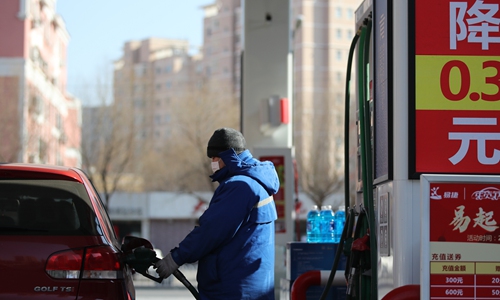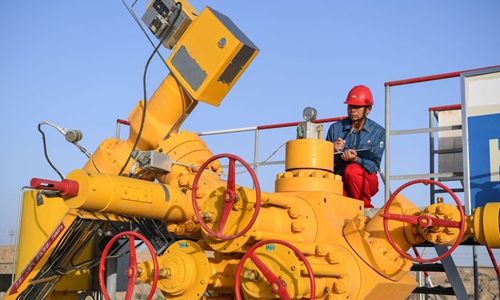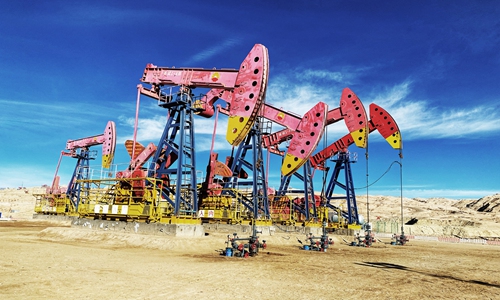Coronavirus epidemic batters China’s energy, mineral trade
Coronavirus epidemic batters nation’s energy, mineral trade

A worker fills his tank at a gas station in Shenyang, capital of Northeast China's Liaoning Province. Photo: cnsphotos
China's commodity trade is being battered by the novel coronavirus pneumonia (COVID-19) with some imports of liquefied natural gas (LNG) suspended and contracts going unimplemented due to declining demand, said industry analysts, adding that the impact on the global commodity market will become evident soon.
Domestic oil, steel, mineral and coal production and demand have been severely weakened due to disrupted transportation and declining demand from consumers and enterprises amid the virus outbreak, they said.
In the short term, China's imports of energy products, especially LNG, would fall, Jin Lei, an associate professor at the Beijing-based China University of Petroleum, told the Global Times on Sunday.
"LNG imports from some countries, including Australia, have been halted as some LNG receiving stations have almost full storage while demand is weak," he said.
Oil demand has also declined sharply as people are urged to stay home and traffic is restricted to prevent the epidemic from spreading.
"From what I know, the volume of gasoline that some stations sold in January and early February was less than 20 percent of that seen during normal times," Jin said.
As oil can't be transported to refineries, downstream chemical processing will accordingly be affected, Jin said, noting that many refineries face an oil shortage.
Some large contracts can't even be implemented, involving those from China's state-owned oil and gas importers including China National Offshore Oil Corp, China National Petroleum Corp and China Petroleum & Chemical Corp, an insider told the Global Times on Sunday.
All these would lead to a short-term imbalance in global oil and gas demand and supply, Jin said.
The International Energy Agency (IEA) has forecast that global oil demand is set to fall this quarter due to the viral outbreak, which would be the first time since the financial crisis in 2009.
IEA said that demand in the first quarter of 2020 is expected to fall by 435,000 barrels per day (bpd) compared with a year earlier, it said, noting it would be "the first quarterly decrease in more than a decade," while it hoped for a demand rebound.
Moreover, normal production for steel, coal and mineral firms was also disrupted after an extended Spring Festival holiday.
On February 10, also the first national working day, only about 57.8 percent of coal miners managed to resume work, according to official figures.
An official at a city in North China's Inner Mongolia Autonomous Region, which has the county's most abundant mineral reserves, told the Global Times on Sunday that steel and mineral firms in the city have "all come to a stop," and the exact date for work resumption is yet to be known.
According to a letter by the China Iron and Steel Industry Association filed with the Ministry of Transport seen by the Global Times, in the steel industry, interruptions in transportation due to the virus have greatly disrupted the supply chain of China's steel industry.
"Some steel firms even face an outage of raw materials," read the letter, adding that Angang Steel Co's coking coal storage can only sustain work for around 10 days, while Nanjing Nangang Iron and Steel United Co's limestone inventory will only last about two days.
Despite the short-term impact, Jin said that if the spread of the COVID-19 outside Central China's Hubei Province can be contained by the end of February and disappears in April, the domestic need for bulk commodities is expected to rebound sharply during the rest of 2020.



